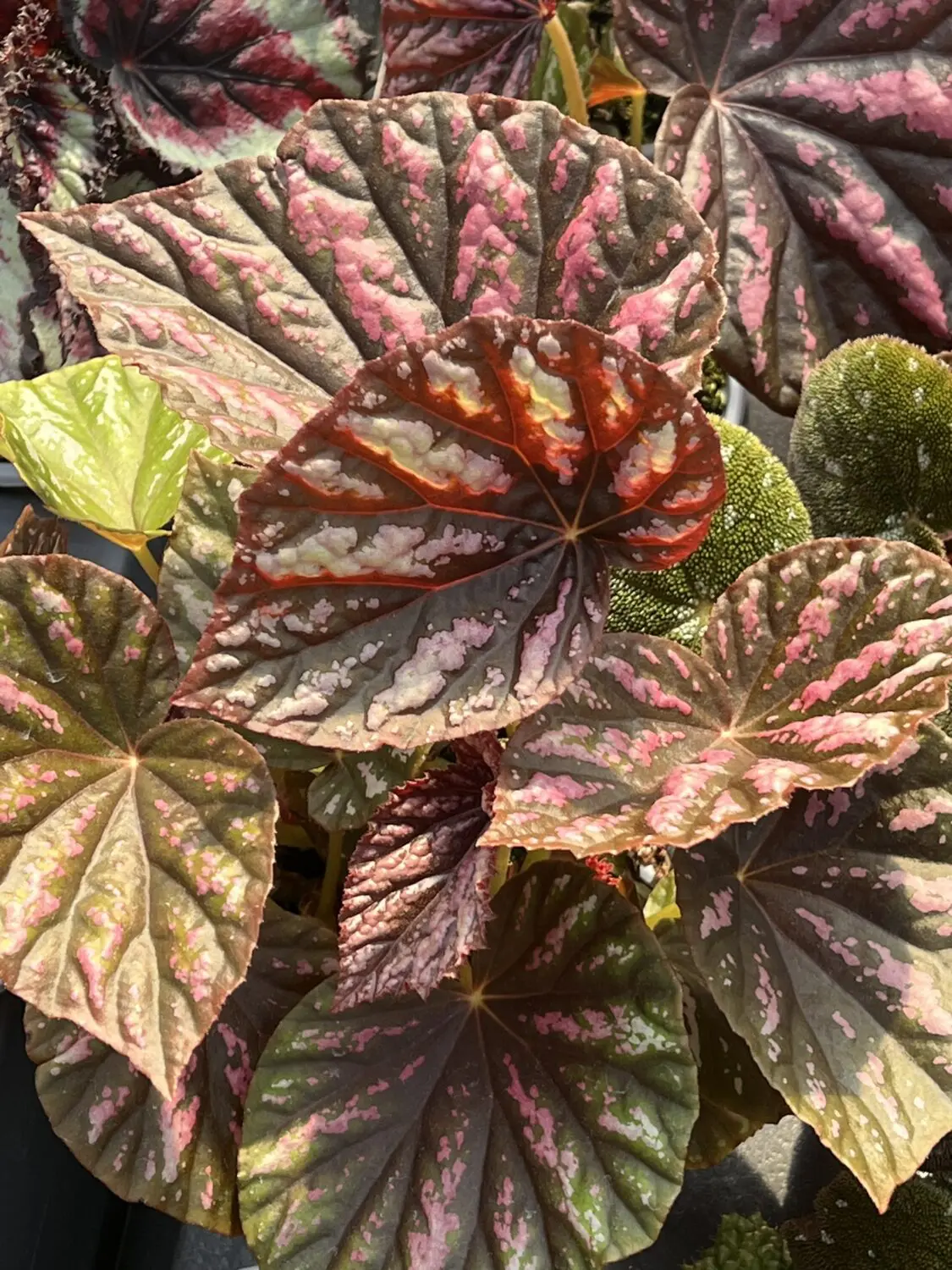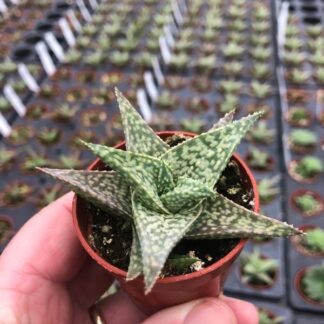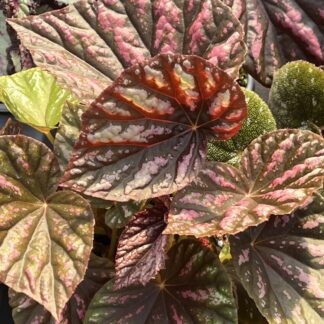Description
Begonia Rex ‘Candy Stripes’
The Begonia Rex ‘Candy Stripes’ is a breathtaking variety of Rex Begonia, renowned for its vibrant, eye-catching foliage that brings color and drama to any space. This dazzling plant is perfect for plant enthusiasts, collectors, and gardeners looking for a unique centerpiece in their collection. Known for its bold colors, compact growth habit, and adaptability, Candy Stripes is a must-have for anyone who appreciates the beauty of ornamental foliage.
The leaves of Begonia Rex ‘Candy Stripes’ are a visual feast, boasting swirling patterns of pink, red, and silver with deep green or burgundy edges. The intricate veining and metallic sheen add depth and texture, making this plant a standout in any setting. Its compact growth habit makes it ideal for small spaces, terrariums, or as part of a mixed display with other tropical plants.
Although grown primarily for its foliage, this variety may produce small, delicate flowers that appear sporadically, adding a subtle charm to its vibrant leaves. With proper care, Begonia Rex ‘Candy Stripes’ thrives as an indoor plant, in shaded outdoor areas, or as part of a greenhouse collection, offering beauty and elegance year-round.
Key Features of Begonia Rex ‘Candy Stripes’
- Striking Foliage
Bold, swirling patterns of pink, red, silver, and green with a metallic sheen, creating a dramatic and unique look. - Compact Growth Habit
Perfect for small spaces, terrariums, or as part of a larger plant display. - Low Maintenance
Requires minimal effort to maintain with proper light, water, and humidity. - Ornamental Appeal
Primarily grown for its foliage, though it may occasionally produce small flowers. - Versatile Placement
Ideal for indoor growing, shaded garden beds, or greenhouse collections. - Tropical Beauty
Brings a lush, exotic vibe to any home or garden.
How to Grow and Care for Begonia Rex ‘Candy Stripes’
Although it looks exotic, Begonia Rex ‘Candy Stripes’ is relatively easy to grow with the right care. Here’s a comprehensive guide to help your plant thrive.
1. Choosing the Right Location
- Light Requirements:
Begonia Rex ‘Candy Stripes’ thrives in bright, indirect light. Avoid direct sunlight, as it can scorch its delicate leaves. Indoors, place it near an east- or north-facing window, or use sheer curtains to diffuse strong light. Outdoors, choose a shaded or semi-shaded area. - Temperature and Humidity:
This tropical plant prefers warm temperatures between 65–80°F (18–27°C). It thrives in high humidity (50–70%), making it perfect for terrariums or naturally humid environments like bathrooms. Use a pebble tray or a humidifier to increase humidity in drier climates.
2. Soil and Planting
- Soil Type:
Use a well-draining, nutrient-rich potting mix. A blend of peat moss, perlite, and compost works well, ensuring the soil retains some moisture without becoming waterlogged. - Planting Instructions:
- Choose a container with drainage holes to prevent waterlogging.
- If planting outdoors, ensure the soil is rich and well-draining, with a sheltered location to protect the plant from wind and direct sun.
- Repot every 1–2 years or when the plant outgrows its container, using fresh soil to replenish nutrients.
3. Watering
- Consistent Moisture:
Keep the soil evenly moist but not soggy. Water the plant when the top inch of soil feels dry to the touch. Use room-temperature water to avoid shocking the roots. - Avoid Overwatering:
Overwatering is a common issue with Rex Begonias, leading to root rot. Ensure the pot has proper drainage and never let the plant sit in standing water. - Humidity Needs:
If your environment is dry, mist the plant lightly, use a pebble tray, or group it with other humidity-loving plants.
4. Fertilizing
- Regular Feeding:
Feed Begonia Rex ‘Candy Stripes’ every 2–4 weeks during the growing season (spring through summer) with a diluted, balanced liquid fertilizer (10-10-10 or similar). Reduce feeding during the fall and winter when growth slows. - Organic Options:
Use compost tea or a slow-release organic fertilizer for a natural approach.
5. Pruning and Maintenance
- Pruning for Shape:
Trim back leggy or damaged stems to maintain a compact, bushy appearance. This also encourages new growth and helps improve airflow around the plant. - Cleaning Leaves:
Gently wipe the leaves with a damp cloth to remove dust and maintain their vibrant colors. - Repotting:
When repotting, choose a pot slightly larger than the current one and refresh the soil to support healthy growth.
6. Propagation
Begonia Rex ‘Candy Stripes’ can be propagated through leaf or stem cuttings, making it easy to share with friends or expand your collection.
- Leaf Cuttings:
- Cut a healthy leaf and slice it into sections, ensuring each section contains a vein.
- Place the sections flat on moist potting soil and pin them down.
- Stem Cuttings:
- Take a healthy stem with at least one node and place it in moist potting mix or water.
- Keep the cuttings in a warm, humid environment with indirect light until roots form.
7. Pests and Diseases
- Pests:
Begonia Rex ‘Candy Stripes’ may attract spider mites, mealybugs, or aphids. Treat infestations with neem oil, insecticidal soap, or by introducing beneficial insects like ladybugs. - Diseases:
Overwatering or poor airflow can lead to fungal issues such as powdery mildew or botrytis. Ensure proper watering practices, good ventilation, and avoid wetting the leaves during watering.
8. Winter Care
- Indoor Protection:
In cooler climates, move Begonia Rex ‘Candy Stripes’ indoors before temperatures drop below 60°F (16°C). Place it in a warm, bright location and reduce watering during winter months. - Dormancy:
If growth slows during winter, allow the plant to rest by reducing watering and feeding.
Landscaping and Decorative Uses
The versatility and dramatic foliage of Begonia Rex ‘Candy Stripes’ make it a standout addition to various indoor and outdoor spaces:
- Indoor Decor:
Adds a splash of color to desks, shelves, or side tables. - Terrariums:
Ideal for terrariums or enclosed environments due to its compact size and humidity needs. - Shaded Garden Areas:
Thrives as an accent plant in shaded garden beds or under taller plants. - Greenhouse Collections:
A prized addition for collectors due to its rare and striking appearance.
Common Problems and Solutions
- Yellowing Leaves
- Cause: Overwatering or nutrient deficiency.
- Solution: Allow the soil to dry slightly between waterings and apply a balanced fertilizer.
- Leggy Growth
- Cause: Insufficient light.
- Solution: Move the plant to a brighter location with indirect light.
- Drooping Leaves
- Cause: Underwatering or low humidity.
- Solution: Water thoroughly and increase humidity around the plant.
The Begonia Rex ‘Candy Stripes’ is a stunning and unique plant that combines vibrant foliage with ease of care. Its bold colors, compact size, and adaptability make it a favorite for indoor spaces, terrariums, and shaded garden beds. Whether you’re a seasoned gardener or a beginner, this begonia variety is sure to impress with its showstopping appearance and manageable care requirements.
By following the care instructions outlined above, you can enjoy the beauty and elegance of Begonia Rex ‘Candy Stripes’ for years to come. This exceptional plant is the perfect choice for adding a touch of tropical charm and vibrant color to any space.





